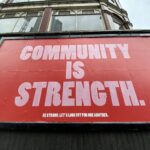Editor’s Note: This week’s guest contributor offers a rich and fascinating framework for reflecting on faith and our faith journeys. Brian Fraser is a nonprofit consultant and Presbyterian minister based in British Columbia. We had the privilege of working together in growing the field of nonprofit capacity building. Read on and I think you will come to enjoy his self-described title of provocateur as I do.
Twenty years ago, I left an executive position in a faith-based nonprofit (I was dean of the Presbyterian college at the University of British Columbia and taught organizational development and leadership at Vancouver School of Theology) to launch a consulting firm that sought to provoke greater institutional flourishing in the sector. I needed a catchy angle to attract attention and found it in jazz. Thus, Jazzthink Consulting was born. Little did I imagine the lessons I would learn as I collaborated with others in imaging new ways of cultivating the common good. My faith was reformulated one conversation after another with people in both the visible and the invisible church.
Here, in brief, are the three lessons that currently fascinate me most.
Everyone is a jazz musician
At the very beginning of imagining Jazzthink, I found in the work of Stephen Nachmanovitch and Donald Schön the idea that the most common form of jazz in human experience is ordinary conversation. You have a structure within which the conversation takes place – vocabulary and grammar – but every time you use the structure you improvise with different words, tones, and interactions. The application, in all of its intriguing forms, was that if we managed the sound and substance of our voices in the conversations that co-create an organization like jazz musicians manage the sound and substance of their instruments in a performance, we’d generate a much better organization. And we already have the skills. All of us over the age of 13, following the 10,000-hour rule as described in Malcolm Gladwell’s Tipping Point (2000), have mastered the art of having a conversation, regardless of how much we need to hone that skill.
Everyone’s voice is valuable
Over the past twenty years, I’ve hung out with a lot of jazz musicians in a lot of places – clubs, concerts, organizational and leadership development workshops and keynotes, jams, church services and practice sessions. Listening to them talk about their art is inspiring and instructive. Of particular note is their respect for each other, their yearning to learn, and their dedication to the community that is jazz. I’m especially impressed with the mutuality of the interactions among the generations. No matter where you may be in your career as a jazz musician, you listen with respect and contribute with candor. These conversations happen both in the formal settings of the performances, often with the musical instruments being the means of communicating and in informal hanging out with each other. The more formal settings happen when we gather in meetings of various kinds, both within the organization and with representatives of the broader community. The informal settings are chats around the office, over food and drinks, with friends on walks or in jazz clubs. Every conversation is an opportunity to compose your presence more faithfully, wisely and effectively as you respect the value of the other voices.
Make it feel good
Monty Alexander is one of the world’s most respected jazz pianists. Born and raised in Jamaica in the Bob Marley era, he brings that vibe to his playing/conversing. In the liner notes on Impressions in Blue, he wrote, “Jazz, at its best, is a situation in which participants willingly support each other, working together as one and going along with the ‘driver’s’ directions, each player bringing virtuosity, optimism, mutual respect, good will and, of course, the desire to ‘make it feel good’ for all human beings in the general proximity.” That’s a pretty good mantra for leadership in the nonprofit sector. It’s also a pretty good aspiration for anyone seeking to reformulate their faith in continuously improving our ambassadorship of God’s forgiving and reconciling love (2 Corinthians 5:19-21).
What’s this got to do with faith formation
We contribute to the well-being of creation one conversation after another. Within my practice of the Christian tradition, as a contributor to that community’s service to the flourishing of this world, I seek to compose conversations with God, with others, and with myself that cultivate justice with kindness and humility (Micah 6:8). That’s a challenging and gratifying path. And jazz is a provocative mentor for that way of being together caring for the creation.
Faith is communal before it is personal. In a culture so addicted to individualism, materialism and consumerism, forming an alternative way of being together is literally a matter of life and death. That way can be inspired and instructed by jazz.




What a wonderful post! I just got back from visiting family and experienced lots of conversations.
I like that Brian speaks to “respect(ing) the value of the other voices.” I always learn and grow when I pay attention to that.
Jazz is such a collaborative and cooperative art form: I’ll try to remember its thrust in my faith and spirituality. Thanks!
Thanks for those considerations, Sally. Glad the post was nourishing.
Thanks Sally, yes our words and bodies communicate a different rthymn moment by moment. Thanks to Brian for increasoing our awareness of that!